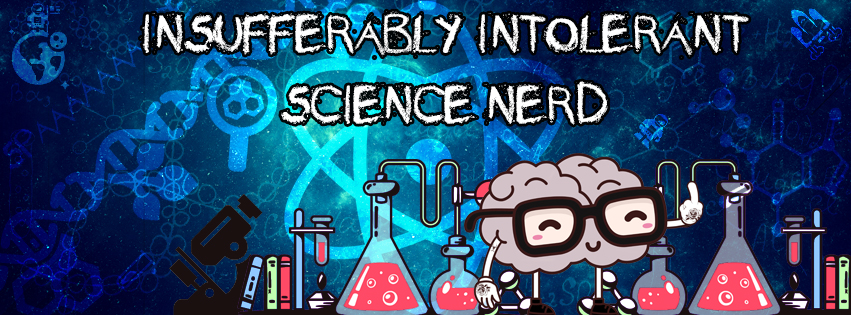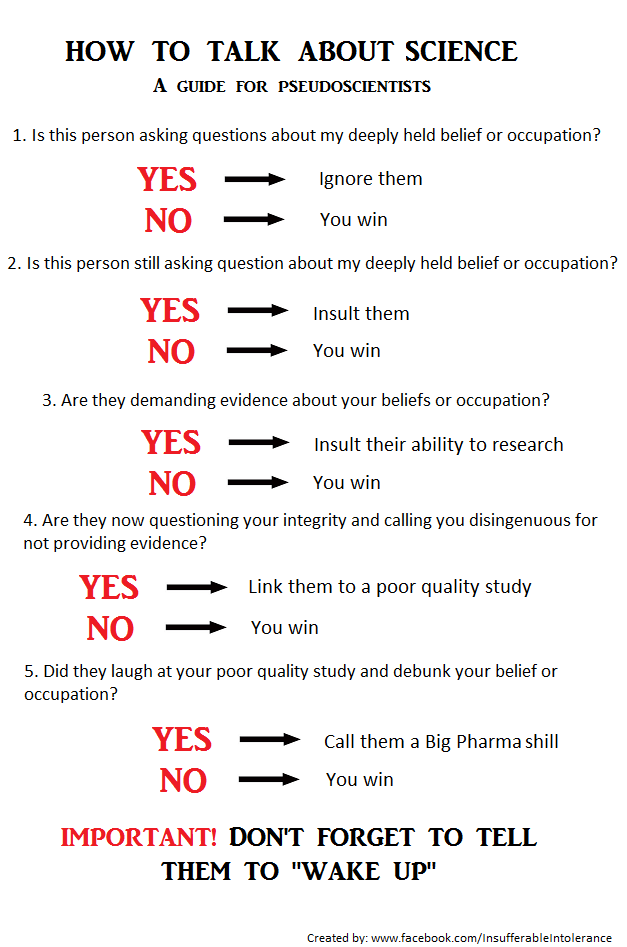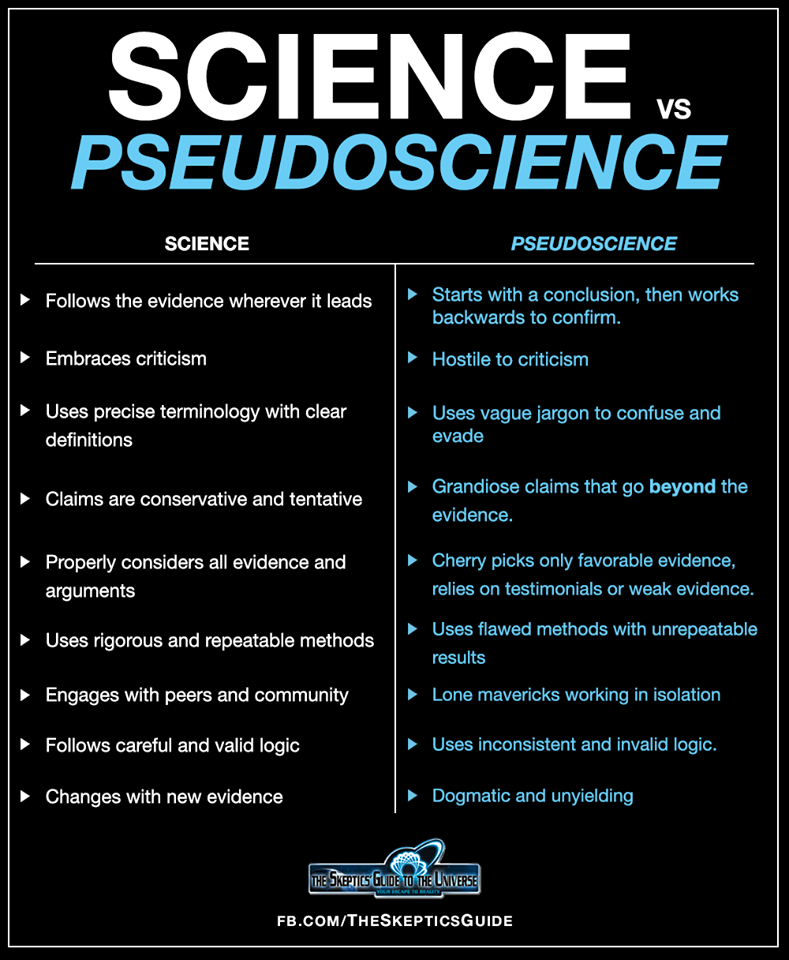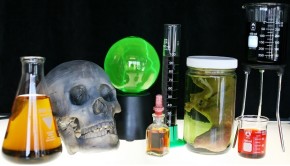You might be a pseudoscientist if..
You claim that scientifically accepted medical treatments are unsafe and/or do not work, while promoting alternative treatments that are dangerous and/or untested. Often these alternative treatments are based in magical thinking with underlying frameworks rooted in vague unexplainable fantasy that cannot be measured by scientific means.
You rant about “toxins” however you cannot explain a specific type or its role or effect on the human body.
You claim you can live “chemical free” yet you don’t understand the basics of chemistry and what chemicals actually are.
You’re level of arrogance despite no scientific training is a testament to how narcissistic you are. You automatically dismiss the studies and research of hundreds of scientists over hundreds of years in favour of your own Google University “skills”. You live in a delusion that anecdotal evidence and “parental instinct” trumps trained professionals and the scientific method. You surround yourself only with other parents who believe the same thing and silence scientifically literate people with cries of “You need to respect my opinion”. If you have ever said “You need to wake up!”, it’s safe to say you’ve swallowed the Kool-Aide.
You vehemently oppose international pharmaceutical companies citing the millions they make as evidence of their “corruption”, while failing to understand that companies producing alternative treatments are also international companies that make millions.
You claim there is a conspiracy against you or from the company/organisation/people who disagree with you. Pseudoscientific cranks such as anti-vaxxers have created the Big Pharma conspiracy to explain away the flaws in their own thinking. It’s easier to believe in an international multi-level conspiracy (that includes governments, scientists, doctors, nurses and drug companies) to keep people sick to turn a profit than it is to admit that you maybe wrong.
You respond to criticism like this:
You are hostile against scientific consensus citing the reasons why no-one will take you seriously is that you are being “silenced” by doctors/scientists/Big Pharma who “don’t want people to know the truth”.
You state scientific consensus is nothing more than an argument from popularity while simultaneously promoting alternatives treatments as effective or else “Why would so many people use them?”.
“Natural equals good, chemical equals bad” is your motto.
Thanks to FB for these great suggestions:
You refuse the vitamin k injection for your newborn but obtain the services of a craniosacral therapist and/or chiropractor.
You think Mercola, Natural News and whale.to contains credible medical and nutritional information and that “organic” and “natural” are the only way to go.
You get excited when you see Starbucks, not because you need your cup of coffee, but because you can’t wait for your next coffee enema.
You treat anything vaguely suspicious with black salve, even without a diagnosis while talking about the dangers of vaccines.
You give your kid homeopathic tablets and/or drops instead of real medicine. You don’t own a microwave. You have a fluoride filter.
You believe vaccines cause autism yet promote dangerous untested treatments such as chelation, ingesting a solution of diluted bleach and bleach enemas for autistic children.
You use autism as a threat to convince your friends not to vaccinate their children.
You think anecdotes and testimonials are better than high quality, randomised control studies.
You refuse to read guides like this one about how to tell the difference between science and pseudoscience because you may need to admit you were wrong.
The following table well help to understand the difference between science and pseudoscience (thanks to Chem1):
science |
pseudoscience |
comment |
| The primary goal of science is to achieve a more complete and more unified understanding of the physical world. | Pseudosciences are more likely to be driven by ideological, cultural, or commercial goals. | Some examples: astrology (from ancient Babylonian culture,) UFO-ology (popular culture and mistrust of government), Creation Science (attempt to justify a literal interpretation of the Bible), “structure-altered” waters (commercial quackery.) |
| Most scientific fields are the subjects of intense research which result in the continual expansion of knowledge in the discipline. | The field has evolved very little since it was first established. The small amount of research and experimentation that is carried out is generally done more to justify the belief than to extend it. | The search for new knowledge is the driving force behind the evolution of any scientific field. Nearly every new finding raises new questions that beg exploration. There is little evidence of this in the pseudosciences. |
| Workers in the field commonly seek out counterexamples or findings that appear to be inconsistent with accepted theories. | In the pseudosciences, a challenge to accepted dogma is often considered a hostile act if not heresy, and leads to bitter disputes or even schisms. | Sciences advance by accommodating themselves to change as new information is obtained.In science, the person who shows that a generally accepted belief is wrong or incomplete is more likely to be considered a hero than a heretic. |
| Observations or data that are not consistent with current scientific understanding, once shown to be credible, generate intense interest among scientists and stimulate additional studies. | Observations or data that are not consistent with established beliefs tend to be ignored or actively suppressed. | Have you noticed how self-styled psychics always seem eager to announce their predictions for the new year, but never like to talk about how many of last years’ predictions were correct? |
| Science is a process in which each principle must be tested in the crucible of experience and remains subject to being questioned or rejected at any time. | The major tenets and principles of the field are often not falsifiable, and are unlikely ever to be altered or shown to be wrong. | Enthusiasts incorrectly take the logical impossibility of disproving a pseudoscientific priniciple as evidence of its validity. |
| Scientific ideas and concepts must stand or fall on their own merits, based on existing knowledge and on evidence. | Pseudoscientific concepts tend to be shaped by individual egos and personalities, almost always by individuals who are not in contact with mainstream science. They often invoke authority (a famous name, for example) for support. | Have you ever noticed how proponents of pseudoscientific ideas are more likely to list all of the degrees they have? |
| Scientific explanations must be stated in clear, unambiguous terms. | Pseudoscientific explanations tend to be vague and ambiguous, often invoking scientific terms in dubious contexts. | Phrases such as “energy vibrations” or “subtle energy fields” may sound impressive, but they are essentially meaningless. |
And here is a helpful guide from the Skeptics Guide to the Universe:









Great post and sums up a very vocal minority who unfortunately wield a lot of influence over parents who just want to do the best by their kids.
Pingback: » The irony of alternative medicine
Pingback: » How to make money like the Food Babe